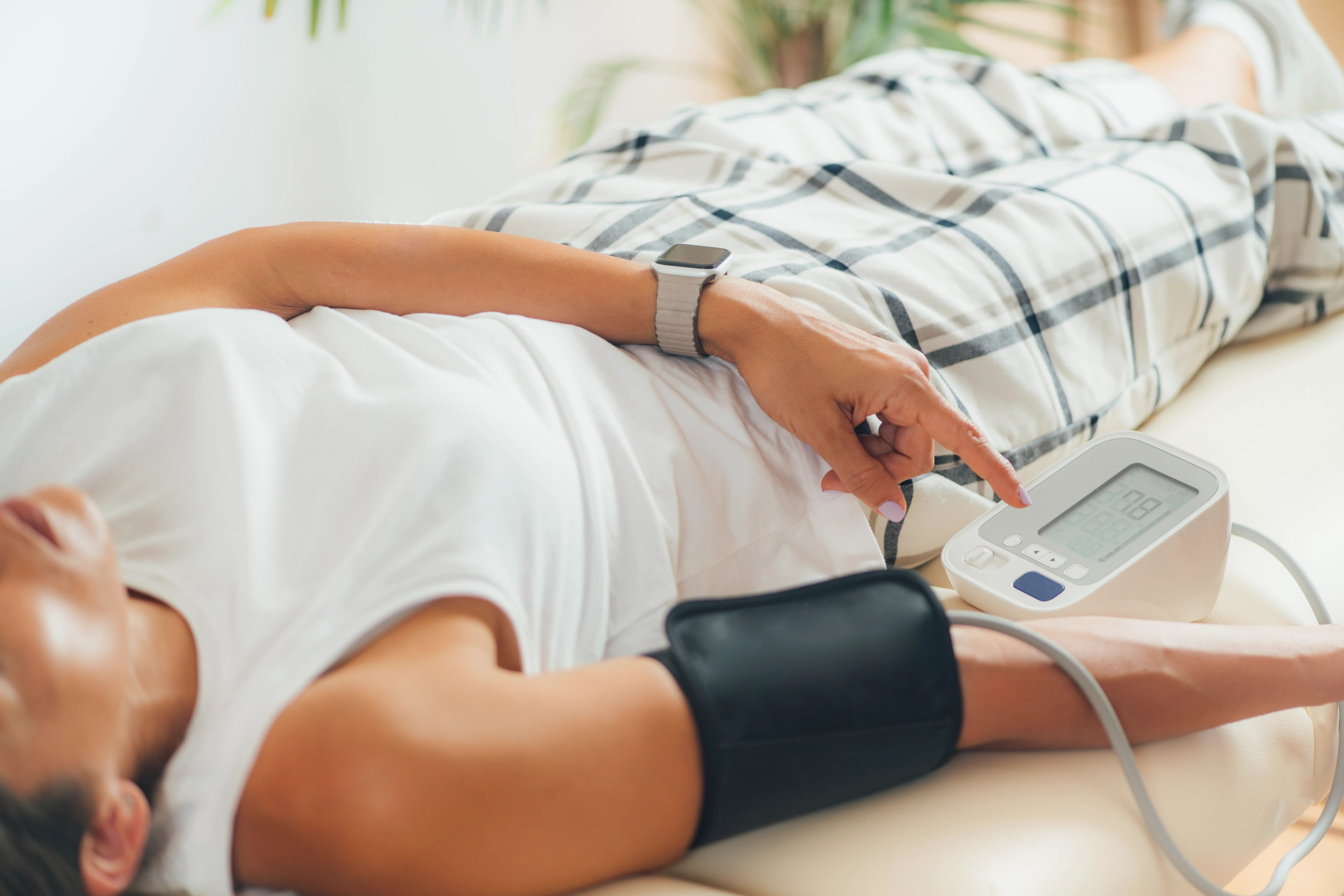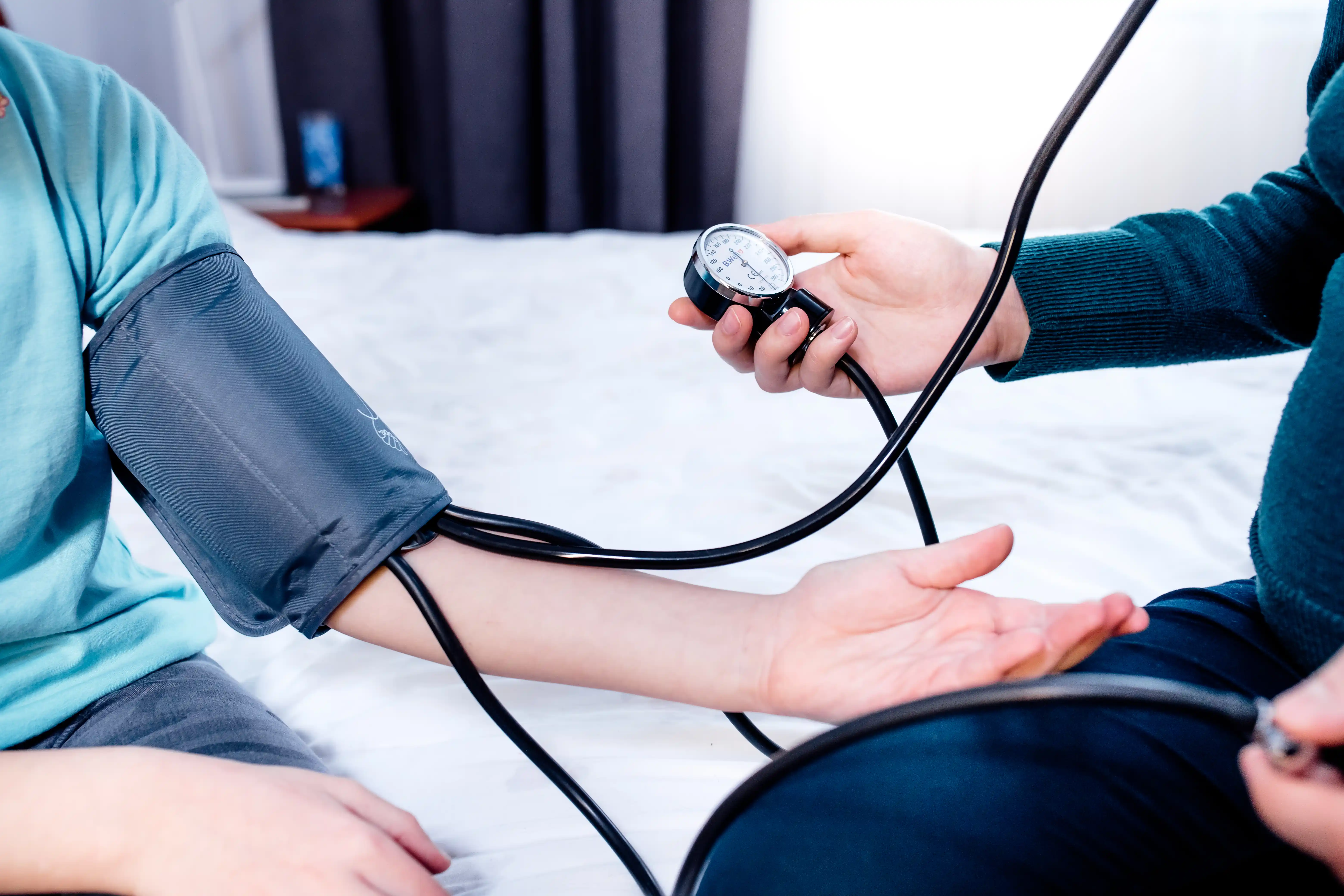Sleep apnea is more than just snoring; it’s a serious sleep disorder that disrupts breathing during the night and silently strains your heart. One of the most significant health risks linked to sleep apnea is high blood pressure (hypertension). If left untreated, this combination can lead to long-term damage to your heart, brain, and blood vessels.
In this article, we’ll explain how sleep apnea affects blood pressure, the underlying mechanisms, and how treating sleep apnea can help improve your cardiovascular health.
What Is Sleep Apnea?
Sleep apnea is a disorder where breathing stops and starts during sleep. The most common type is obstructive sleep apnea, which occurs when the muscles in your throat relax too much and block your airway.
Less commonly, central sleep apnea happens when the brain doesn’t send proper signals to the muscles responsible for breathing. Both forms interfere with oxygen levels and disrupt the quality of your sleep.
People with sleep apnea often wake up feeling tired, even after a full night in bed. They may snore loudly, gasp for air during sleep, and experience morning headaches or excessive daytime sleepiness. In many cases, individuals are unaware they have the condition until someone else notices their symptoms.
What Is High Blood Pressure?
High blood pressure, or hypertension, occurs when the force of blood against the artery walls stays elevated over time. This puts extra strain on the heart and blood vessels, increasing the risk of heart attacks, strokes, and kidney problems.
Blood pressure is considered high when it consistently measures 130 over 80 millimeters of mercury or more. Many people with high blood pressure have no symptoms, which is why it’s often called the “silent killer.” It can go undetected for years while quietly damaging your organs.
While lifestyle factors like poor diet, lack of exercise, and stress play a role, sleep apnea is a lesser-known but powerful contributor to persistent hypertension.
How Sleep Apnea Raises Blood Pressure

Sleep apnea raises blood pressure through a combination of oxygen deprivation, stress responses, and disrupted sleep architecture. Each episode of paused breathing sends shockwaves through the cardiovascular system, triggering reactions that, over time, elevate your blood pressure both at night and during the day.
Oxygen Deprivation and Blood Vessel Constriction
During a sleep apnea episode, the airway becomes blocked, preventing oxygen from reaching the lungs and, in turn, the rest of the body. This drop in oxygen saturation is known as intermittent hypoxia. To compensate, the body reacts by constricting blood vessels in an attempt to maintain oxygen delivery to vital organs.
This vasoconstriction increases resistance within the blood vessels, forcing the heart to pump harder, which leads to a spike in blood pressure. Over time, repeated episodes of oxygen deprivation condition the body to maintain higher blood pressure levels, even outside of sleep.
The Role of the Sympathetic Nervous System
The sympathetic nervous system is your body’s built-in alarm system. When it detects low oxygen levels caused by apnea, it responds as if you are in immediate danger, triggering a fight-or-flight reaction.
This involves the release of stress hormones, such as adrenaline, which increases heart rate and constricts blood vessels. These physiological changes are meant to be temporary, but in people with untreated sleep apnea, the body is exposed to them night after night.
This overactivation of the sympathetic nervous system can lead to sustained high blood pressure throughout the day, even when the person is awake and breathing normally.
Why Sleep Apnea Can Make Blood Pressure Spike at Night
In healthy individuals, blood pressure naturally dips during sleep, giving the cardiovascular system a chance to rest. This nighttime decline is known as nocturnal dipping. However, people with sleep apnea often miss out on this beneficial pattern because their sleep is constantly interrupted by apneic episodes.
Each time breathing stops, the body abruptly wakes, even if only partially, which disrupts the deep stages of sleep where dipping would normally occur. As a result, instead of dropping, blood pressure may remain high or even rise throughout the night.
This abnormal pattern, known as non-dipping or reverse-dipping, is strongly linked to a higher risk of heart attack, stroke, and other cardiovascular events.
How to Know If Sleep Apnea Is Affecting Your Blood Pressure

Recognizing the signs of sleep apnea is crucial, especially if you're struggling to manage high blood pressure. Many symptoms occur during sleep or early in the morning, so they’re easy to overlook. If you notice any of the following, sleep apnea may be contributing to your elevated blood pressure:
Signs and Symptoms to Watch For
Paying attention to these signs can help identify sleep apnea early and prevent its long-term impact on blood pressure and heart health.
- Loud, Frequent Snoring or Choking Sounds During Sleep: Loud, frequent snoring or choking sounds during sleep are classic signs of obstructive sleep apnea. These disruptions signal repeated airway blockages that cause spikes in blood pressure as the body struggles to restore airflow.
- Excessive Daytime Sleepiness and Fatigue: Excessive daytime sleepiness and fatigue result from fragmented sleep caused by repeated breathing interruptions. This ongoing exhaustion can trigger hormonal changes and increase blood pressure over time.
- Morning Headaches or Dry Mouth: Morning headaches or dry mouth often follow nights of poor oxygenation and open-mouth breathing. These symptoms reflect underlying breathing disturbances that stimulate the nervous system and raise blood pressure.
- Difficulty Controlling Blood Pressure Despite Medication: Difficulty controlling blood pressure despite medication may be a sign of untreated sleep apnea. Breathing disruptions throughout the night interfere with the body’s ability to regulate blood pressure naturally.
- Restless or Disrupted Sleep Patterns: Restless or disrupted sleep patterns, such as tossing, turning, or frequent awakenings, are often caused by repeated apneic events. These disturbances prevent deep sleep and contribute to chronic blood pressure elevation.
- Frequent Nighttime Urination (Nocturia): Frequent nighttime urination, or nocturia, is linked to sleep apnea through hormonal changes that increase urine production. This reflects cardiovascular strain that can worsen high blood pressure.
- Observed Pauses in Breathing by a Sleep Partner: Observed pauses in breathing by a sleep partner are a strong warning sign of sleep apnea. Each pause may lead to oxygen drops and blood pressure surges as the body reacts to restore normal breathing.
Who Is at Risk?
Certain groups are more prone to both sleep apnea and high blood pressure. These include people who are overweight or obese, men, older adults, and those with a family history of either condition. Lifestyle factors such as smoking, excessive alcohol consumption, and physical inactivity also increase risk.
Additionally, individuals with diabetes or anatomical features like a narrow airway or enlarged tonsils may be more vulnerable. Recognizing these risk factors can help with early diagnosis and management to prevent complications.
Managing Both Conditions Effectively
Managing sleep apnea and high blood pressure together requires a comprehensive approach that targets both conditions. Proper treatment of sleep apnea can improve blood pressure control, while lifestyle changes benefit overall cardiovascular health.
Coordination between your healthcare providers ensures that therapies complement each other and address underlying causes. This holistic strategy not only improves sleep quality but also reduces the risk of serious heart-related events.
Treatment for Sleep Apnea
The primary treatment for moderate to severe sleep apnea is continuous positive airway pressure (CPAP) therapy, which keeps the airway open during sleep and prevents breathing interruptions.
For those who cannot tolerate CPAP, alternatives include oral appliances that reposition the jaw or tongue, lifestyle modifications such as weight loss, and surgical options in select cases.
Impact of CPAP on Blood Pressure
Regular use of CPAP has been shown to lower both nighttime and daytime blood pressure by reducing oxygen drops and calming the body’s stress response. Improvements can occur within weeks to months and may reduce dependence on blood pressure medications. CPAP therapy is a key tool for protecting heart health in people with sleep apnea and hypertension.
Lifestyle Changes
Making simple adjustments to your daily habits can significantly reduce sleep apnea symptoms and help manage blood pressure. These lifestyle changes support better breathing and improve overall sleep quality.
- Limit Alcohol and Sedatives: Alcohol and sedatives relax the muscles in your throat, increasing the chance that your airway will collapse during sleep, which worsens sleep apnea.
- Maintain a Consistent Sleep Schedule: Going to bed and waking up at the same time every day helps regulate your body’s internal clock and improves sleep quality, reducing apnea episodes.
- Quit Smoking: Smoking irritates and inflames the airway, making breathing difficulties worse and increasing the severity of sleep apnea.
- Practice Good Sleep Hygiene: Creating a calm, cool, and dark environment encourages uninterrupted sleep and helps reduce breathing disruptions at night.
- Manage Stress: Techniques like mindfulness, meditation, or deep breathing can lower stress levels, improve sleep quality, and help control blood pressure.
Weight Management and Sleep Position
Your body weight and sleeping position play important roles in how severely sleep apnea affects you. Managing your weight and adopting sleep positions that keep your airway open can greatly lessen apnea episodes and improve your health.
- Weight Loss: Losing excess weight reduces fat around the neck and throat, which can narrow the airway and worsen sleep apnea symptoms.
- Balanced Diet and Exercise: A healthy diet combined with regular physical activity supports weight loss and overall cardiovascular health.
- Sleep on Your Side: Side sleeping helps keep your airway open by preventing the tongue and soft tissues from collapsing backward during sleep.
- Use Positional Therapy: Devices or techniques that encourage side sleeping can reduce apnea episodes for people who worsen when sleeping on their back.
- Avoid Back Sleeping: Sleeping on your back often increases airway obstruction, making apnea episodes more frequent and severe.
When to See a Doctor
If you experience persistent symptoms like loud snoring, daytime fatigue, or difficulty controlling your blood pressure despite medication, it’s important to consult a healthcare professional. Early diagnosis and treatment of sleep apnea can prevent serious complications and improve both your sleep and cardiovascular health.
FAQs
Can Sleep Apnea Cause High Blood Pressure?
Yes, sleep apnea can cause high blood pressure by repeatedly lowering oxygen levels and triggering stress responses that raise blood pressure both during sleep and while awake.
Does Treating Sleep Apnea Lower Blood Pressure?
Treating sleep apnea, especially with CPAP therapy, can lower blood pressure by preventing breathing interruptions and reducing strain on the cardiovascular system.
What Type of Sleep Apnea Is Linked to High Blood Pressure?
Obstructive sleep apnea (OSA) is most commonly linked to high blood pressure due to airway blockages that cause repeated oxygen drops and stress responses.
Is High Blood Pressure Worse at Night With Sleep Apnea?
Yes, people with sleep apnea often experience non-dipping or even elevated blood pressure at night because apnea disrupts the normal nighttime blood pressure decline.
Conclusion
Sleep apnea and high blood pressure are closely connected, with untreated apnea significantly contributing to elevated blood pressure and increased cardiovascular risks.
Recognizing symptoms early and seeking proper treatment, such as CPAP therapy and lifestyle changes, can improve sleep quality and help manage blood pressure effectively.
If you suspect sleep apnea may be affecting your health, consulting a healthcare professional can lead to better outcomes and protect your heart in the long term.
Dom Abraham
As the lead content writer at Sleepiverse. Dom pours his heart into writing mattress reviews, bedding product reviews, and medically-reviewed health articles. Dom is from Portugal and likes to spend his free time writing on the beach as it gives him a sense of comfort. Aside from writing mattress reviews in front of the soothing beach view, Dom likes to experiment with new amazing food ideas.


